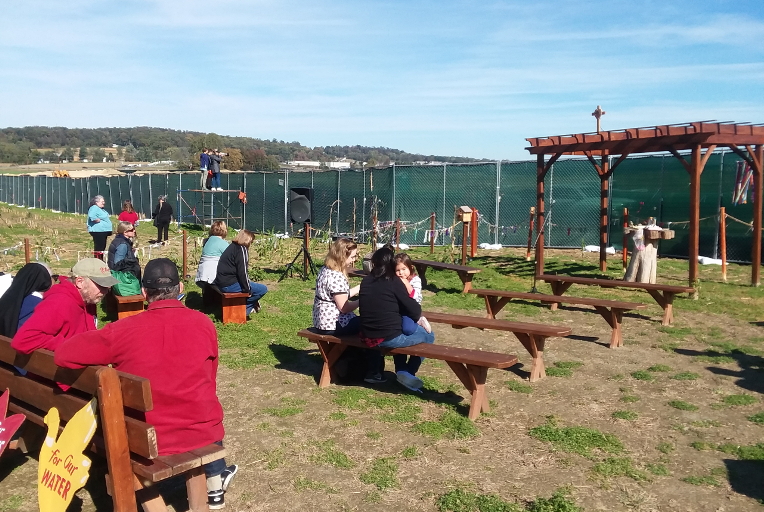Original site: tedglick.com
Two days ago, on October 27th, Lancaster Against Pipelines in central Pa. organized their third action in the last two weeks at the site where the Williams Partners company is laying pipe for the Atlantic Sunrise pipeline. At the previous two actions a total of 29 people were arrested in acts of nonviolent civil disobedience.
The pipe-laying and the cd is happening on land taken by FERC-approved eminent domain that is owned by the Catholic nuns group, Adorers of the Blood of Christ, which has a lawsuit pending against Williams.
An NBC News story on September 17th summarized the Adorers’ legal case: “that FERC and Williams Partners violated their rights under the Religious Freedom and Restoration Act because they are being forced to allow the pipeline to pass through their property, which breaks from their land ethic and deeply held religious beliefs.”
The lawsuit says that this violation: “places a substantial burden on the Adorers’ and Sisters’ exercise of religion by taking land owned by the Adorers that the Sisters seek to protect and preserve as part of their faith and, instead, uses it in a manner and for a purpose that actually places the earth at serious risk.”
The action two days ago was both deeply spiritual, with active participation by Adorers members, and tactically effective. It shut down work on the site for over an hour. It also directly and personally reached out to the Williams workers, 25-30 of them, who listened quietly to songs, prayers and statements for 10 or more minutes as we formed a circle of about 70 people inside the fenced-off and guarded site where pipeline construction has been happening for a couple of weeks.
The afternoon of effective action began with a rally of close to a hundred people at the outdoor chapel built several months ago on Adorers land in collaboration with Lancaster Against Pipelines. The chapel included a kind of altar in the front and benches where people can sit. The altar is literally a few feet away from the fenced off construction site, and the sounds of machinery moving and welding happening were heard throughout the rally.
Following music and an explanation of why we were there, LAP leaders Mark and Malinda Clatterbuck explained the plan for the day. There were seven of us prepared to risk arrest by going onto the site, but before that we were all going to walk a couple hundred yards through a field to the entrance of the work site. There we would mass just outside it on the shoulder of Pa. Route 462. We would sing, hold signs and wait while leaders of LAP negotiated with the state police to get time for our entire group to go onto the work site and conduct a service inside. The “cards” we had to play were, 1) that if they didn’t agree to this, they would then have to arrest an unknown number of people (unknown to the police) and spend hours processing them and 2) arrests would likely generate more press attention to the continuing resistance.
When Mark presented this idea, he made it clear that the fallback plan if this didn’t happen was the risk-arrest action, with everyone else not prepared to do so staying on the shoulder of the road outside the work site. And he also made it clear that he thought the chances of us getting this agreement from the police were between none and the longest of long shots.
So why did they agree?
One reason may be because the negotiations began with us demanding an hour inside. For the police, us agreeing to 10 minutes—after we had shut down work for 45 minutes by our massing at the entrance–may have been seen by them as a big concession on our part.
Another reason was certainly the willingness of at least seven of us to get arrested which, combined with the prior two arrest actions recently organized by LAP, demonstrated our seriousness.
But it was also the fact that this was taking place on Adorers’ land with Adorers sisters present and part of the leadership of the action. This made the action politically more powerful, and it could well have softened the hearts of some of the police.
Once we entered the site, we reached out to the workers with trays of healthy bread brought to share when appropriate. As we walked up into their space, approached them and offered the bread, almost every single one, with a few younger-worker exceptions, literally turned their backs on us. Maybe they were afraid of being seen by their bosses as being too sympathetic. Or maybe there was some shame involved. But whatever the reasons, there’s no question we gave them some things to think and talk about.
The service that we held was very powerful. It can be seen at the 1 hour and 6 minute mark of the video linked here.
LAP’s Pledge to Resist statement, posted at the chapel, ends with these words: “We vow to protect our communities through nonviolent civil disobedience if FERC gives Williams Gas Company permission to poison our water, clear-cut our forests, steal our farms, bulldoze our Native heritage, and put our families at risk. Along with our financial and material resources, we pledge to put our bodies between the land we love and those seeking to destroy it.”
They are now doing and will keep doing just that. Others who appreciate the importance of what they are doing and want to support or take part should make contact.
Teaser photo credit: Lancaster Against Pipelines website.





